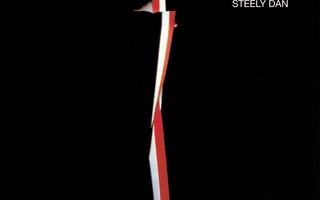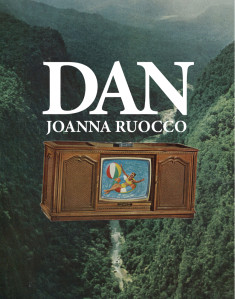Ah, daredevil, daft, delinquent “Dan.” Yes, it could be worthwhile to read this feisty little novel, which was written by Joanna Ruocco and published by an innovative women’s literature group called Dorothy, A Publishing Project. But the worth would not be in its pleasure so much as its pain. The book’s style is an anxious stunt, and its content is a gross chimera of suburban fantasy, parody, and the absurd. Ruocco doesn’t like to feed her readers easy food, so getting through her book the first time around can be tortuous. What's disappointing, however, is that even on a second go “Dan” doesn’t deliver enough; it only continues to dangle its provocative linguistic goods in front of the long-suffering reader’s eyes, ignoring the possibility that said reader may have tired of mere striptease acts. But there will always be works of art whose value is more in what they gesture to than what they are, and “Dan” is a respectable addition to their numbers.
The novel's title refers to a fictional village that is presumably located somewhere in contemporary America. Ruocco withholds geographical specifics; we know only that Dan is a swampy, down-at-heels backwater town set low in the hills. Rumor has it that some time ago, “the town of Dan was a pleasing patchwork of family farms criss-crossed by sportive sheep and grains of golden pollen.” But nobody really knows. There is collective amnesia in Dan, and throughout the book Ruocco hints at Dan’s sinister aspect—“The population of Dan was not large, yet somehow it was difficult to account for all of the residents”—without ever entirely explaining it, which is disappointing. She does haphazardly go into great detail now and then. At one point readers are told, for instance, that buildings in town are infested with snails; elsewhere, that the people of Dan spend every day gorging on bakery pretzels and taking up bland hobbies to pass the time.
Enter Melba Zuzzo: young woman, bakery worker, and, pun unintended, Ruocco’s utterly half-baked heroine. Melba is one of Dan’s few remaining females, a fact that Ruocco delights in pointing out: “When Melba was a young child, far too young for high school, a group of women had disappeared from Dan. They were older women, old enough to bear some responsibility for Dan’s circumstances.” Most other women have died or disappeared since, and now Dan’s men are ganging up on Melba. In the span of a single long day, one of them after another—there’s grumpy neighbor Grady Help, Mark Rand the greedy landlord, Mr. Sack the lecherous history teacher, Officer Greg the grunting policeman, and Don Pond, who is too good to be true—will subtly menace her.
Ruocco has a promising idea here: the Kafkaesque estranged hero with a modern gender spin. To be fair, some of it is well brought off. The amusing Melba is said to be “a provoking daughter, quarrelsome, with habits befitting an earlier kind of person, a person from pre-history.” Her contrarian persuasion is a joy to observe in action. Witness her exchange with Mr. Sack, who propositions her many times: “‘Mr. Sack, I have a problem,’ whispered Melba, almost breathless, ‘I just can’t figure out what time is made of.’ Mr. Sack worked a mauve lollipop out of his pants pocket and he offered it to Melba without speaking. She ignored it.” Melba’s chaste ignorance of male desires, especially her unawareness of just how appealing and dangerous she is in her refusal to pipe down and suck on their male pacifiers, is one of Ruocco’s best running gags.
Yet soon enough the reader gets impatient for a development of Melba’s provocations. True, she does awaken to the absurdity of Dan life. But “awaken” is too generous a word—she doesn’t ever stumble out of the Platonic cave. At most she sights the entrance. Now and then Melba brushes against existential issues like whether life is worth living, but these insights are awkwardly made: “Love is something you find in someone, you search and search, sometimes in the dark, or blindly, like a miner with a pickaxe or like a star-nosed mole.” Or: “Some things are always useless to scrutinize, maybe most things, maybe everything.” “Maybe” is the key word for Melba. Ruocco allows her the briefest of epiphanies: “She saw a spark that began to ripple and then she knew no more.” After this “spark” she spends the rest of the book immobilized on couches and table-tops, trapped by Dan men.
Certainly much of the problem with this book is Ruocco’s failure to give Melba enough credit. Her eternal cloudiness of insight makes the book frustrating and, overall, a disappointment, since the reader is also often put in a demeaning position like her, uncomfortably snailing through, occasionally seeing a stray spark, then no more. Melba’s neuroticism as a character is not endearing; she makes the reader wince and disapprove of her strivings, her frequent blurting out of non sequiturs —“Owls don’t give birth in the air ever?”— and her unremitting lack of tact.
More problematic is the stylistic inhospitality of the world of “Dan” itself for the reader. Ruocco tries to parody clichés of writing, as in the following passage accounting for the disappearance of Dan’s women: “The blame did not rest squarely on Ann Dump. The blame could not be conceived of as a regular polygon, contained and conventionally dimensional. The blame was a bigger, murkier object, with drifty quality that frightened Melba. The blame hung in the sky over the valley. It was like humidity! Or a curse!” Does it matter whether Ruocco’s playing with the word “squarely” leaves good taste behind? The book is a grotesque joke that makes one smile in collusion, but not laugh; at some point, one gives up on its gaudy excesses and resolves just to sit politely through the rest of the show.
Read more in Arts
In 'Betrayers,' Bezmozgis Stays True to Literary TraditionRecommended Articles
-
Wrestlers Reach Semis at LehighBob Claflin and Don Louria fought their way into the semi-finals of the Eastern Wrestling Championships yesterday at Lehigh as
-
Protecting 'Veritas'As a reporter and then executive editor for The Crimson, I have spent hundreds, and maybe even thousands, of hours
-
Dan in Real LifeThe opening shot of “Dan in Real Life,” the latest film from “Pieces of April” director Peter Hedges, focuses, naturally,
-
 Yale Unveils New Target for Pranks
Yale Unveils New Target for Pranks -
 Inauthenticity and the Art of Subversion: The Aja Experience
Inauthenticity and the Art of Subversion: The Aja Experience














